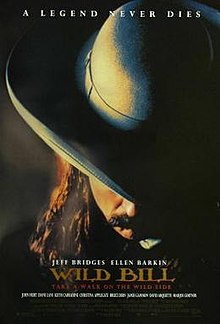
James Butler Hickok, better known as "Wild Bill" Hickok, was a folk hero of the American Old West known for his life on the frontier as a soldier, scout, lawman, cattle rustler, gunslinger, gambler, showman, and actor, and for his involvement in many famous gunfights. He earned a great deal of notoriety in his own time, much of it bolstered by the many outlandish and often fabricated tales he told about himself. Some contemporaneous reports of his exploits are known to be fictitious, but they remain the basis of much of his fame and reputation.
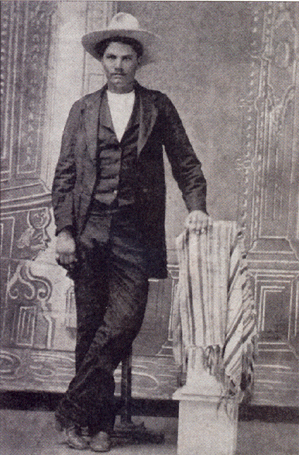
John Wesley Hardin was an American Old West outlaw, gunfighter, and controversial folk icon. Hardin often got into trouble with the law from an early age. He killed his first man at the age of 15, claiming he did so in self-defense.
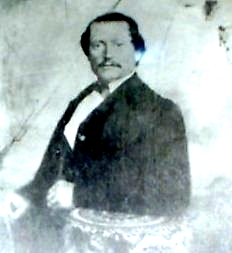
John McCall ;, also known as "Crooked Nose" or "Broken Nose Jack", was the murderer of Old West legend Wild Bill Hickok. McCall shot Hickok from behind as he played poker at Nuttal & Mann's Saloon in Deadwood, Dakota Territory, on August 2, 1876. McCall was executed for the murder on March 1, 1877.

The makeup of poker's dead man's hand has varied through the years. Currently, it is described as a two-pair poker hand consisting of the black aces and black eights. The pair of aces and eights, along with an unknown hole card, were reportedly held by Old West folk hero, lawman, and gunfighter Wild Bill Hickok when he was murdered while playing a game. No contemporaneous source, however, records the exact cards he held when killed. Author Frank Wilstach's 1926 book, Wild Bill Hickok: The Prince of Pistoleers, led to the popular modern held conception of the poker hand's contents.

Little Big Man is a 1970 American Revisionist Western film directed by Arthur Penn, adapted by Calder Willingham from Thomas Berger's 1964 novel of the same title. It stars Dustin Hoffman, Chief Dan George, Faye Dunaway, Martin Balsam, Jeff Corey and Richard Mulligan. The film follows the life of a white man who was raised by members of the Cheyenne nation during the 19th century, then attempts to reintegrate with American pioneer society. Although broadly categorized as a Western, or an epic, the film encompasses several literary/film genres, including comedy, drama and adventure. It parodies typical tropes of the Western genre, contrasting the lives of white settlers and Native Americans throughout the progression of the boy's life.

Deadwood is an American Western television series that aired on the premium cable network HBO from March 21, 2004, to August 27, 2006. The series is set in the 1870s in Deadwood, South Dakota, before and after the area's annexation by the Dakota Territory, and charts Deadwood's growth from camp to town. The show was created, produced, and largely written by David Milch. Deadwood features a large ensemble cast headed by Timothy Olyphant and Ian McShane, playing the real-life Deadwood residents Seth Bullock and Al Swearengen, respectively. Many other historical figures appear as characters, including George Crook, Wyatt Earp, E. B. Farnum, George Hearst, Wild Bill Hickok, Calamity Jane, Sol Star, A. W. Merrick, Jack McCall, and Charlie Utter. The plot lines involving these characters include historical truths as well as substantial fictional elements. Milch used actual diaries and newspapers from 1870s Deadwood residents as reference points for characters, events, and the look and feel of the show.

Calamity Jane is a 1953 American Technicolor Western musical film starring Doris Day and Howard Keel, and directed by David Butler. The musical numbers were staged and directed by Jack Donohue, who a year later would direct the Day musical Lucky Me (1954). The film is loosely based on the life of Wild West heroine Calamity Jane and explores an alleged romance between her and Wild Bill Hickok.
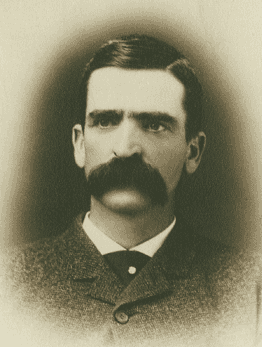
Seth Bullock was a Canadian-American frontiersman, business proprietor, politician, sheriff, and U.S. Marshal. He was a prominent citizen in Deadwood, South Dakota, where he lived from 1876 until his death, operating a hardware store and later a large hotel, the Bullock Hotel.

Charles H. "Colorado Charlie" Utter was a figure of the American Wild West, best known as a great friend and companion of Wild Bill Hickok. He was also friends with Calamity Jane.

The Reverend Henry Weston Smith was an American preacher and early resident of Deadwood, South Dakota.
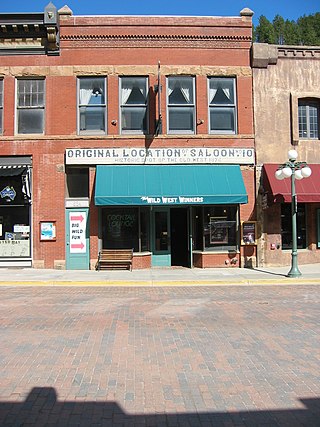
Nuttal & Mann's was a saloon located in Deadwood, southern Dakota Territory, North America. It was noted for being the death-place of James Butler "Wild Bill" Hickok. It was later renamed the "No. 10 Saloon". The current No. 10 Saloon is not at the same location as the original Nuttal & Mann's.

The Plainsman is a 1936 American Western film directed by Cecil B. DeMille and starring Gary Cooper and Jean Arthur. The film presents a highly fictionalized account of the adventures and relationships between Wild Bill Hickok, Calamity Jane, Buffalo Bill Cody, and General George Custer, with a gun-runner named Lattimer as the main villain. The film is notorious for mixing timelines and even has an opening scene with Abraham Lincoln setting the stage for Hickok's adventures. Anthony Quinn has an early acting role as an Indian. A remake using the same title was released in 1966.
Kitty Leroy was a dancer, gambler, saloon owner, prostitute, madam, and trick shooter of the American Old West.

Martha Jane Canary, better known as Calamity Jane, was an American frontierswoman, sharpshooter, and storyteller. In addition to many exploits, she was known for being an acquaintance of Wild Bill Hickok. Late in her life, she appeared in Buffalo Bill's Wild West show and at the 1901 Pan-American Exposition. She is said to have exhibited compassion to others, especially to the sick and needy. This facet of her character contrasted with her daredevil ways and helped to make her a noted frontier figure. She was also known for her habit of wearing men's attire.
"Deadwood" is the first episode of the first season of the HBO original series of the same name. The episode was written by David Milch and directed by Walter Hill. It first aired on March 21, 2004.

Son of Django is a 1967 Italian Spaghetti Western film written and directed by Osvaldo Civirani.

The Old Style Saloon No. 10 is located in Deadwood, South Dakota, United States. The original location is best known as the site where the American Old West legend Wild Bill Hickok was assassinated by Jack McCall while playing a game of poker on August 2, 1876. Saloon No. 10 was originally located on placer claim number 10 from which its name is derived. Fire swept through the mining camp in 1879 destroying the original structure, and a bar was later built at its former location.

Paradise Sky is a novel written by American author Joe R. Lansdale, published by Mulholland Books. It takes place in the post American Civil War era.
